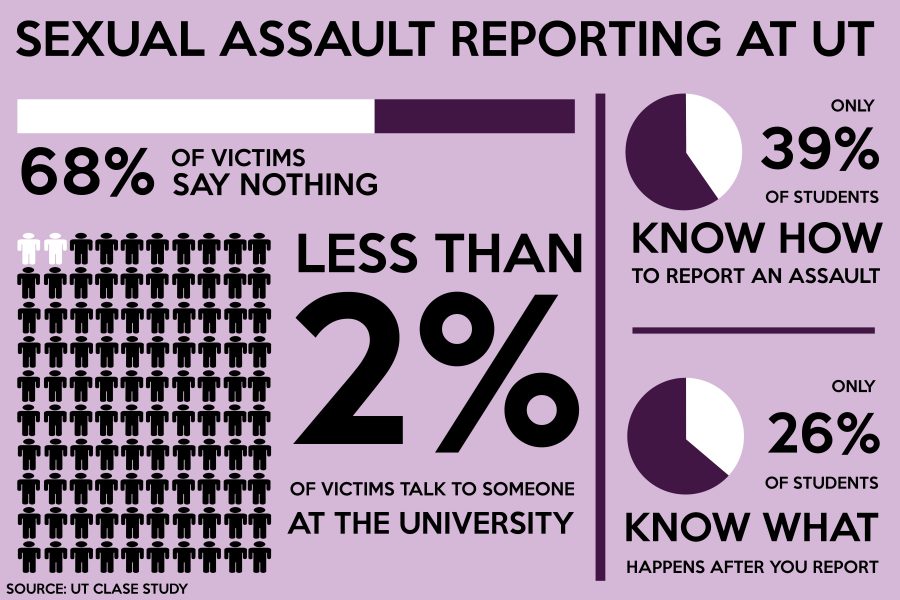One of the most striking features of the University’s sexual assault survey is the rampant underreporting of sexual assaults at UT. Of the 15 percent of female undergraduates who were sexually assaulted, only 32 percent mentioned the assault to anyone. Only 6 percent of victims who told anyone told someone at the University — that’s about 2 percent of all victims.
Obviously, we have a problem with reporting sexual assault at UT. Less obvious, however, is why this is happening.
The 2016 CLASE study, which revealed the extent of underreporting at UT, did not inquire as to why victims did not disclose. However, a 2015 study of UT students found that the majority of victims did not think a report of sexual misconduct would be taken seriously by the University. Regardless of how seriously the University actually takes reports of sexual assault, if students feel that the University would not take them seriously, they remain unlikely to report.
Overwhelmingly, students don’t know how to go about reporting a sexual assault. According to the CLASE study, only 38 percent of students knew how to file a report, and less than 30 percent of students, including victims, knew what was supposed to happen after reporting.
Austin Smith, resident assistant and Voices Against Violence member, credits some of the confusion over how to report sexual assaults to misunderstandings about the process.
“I think there is a misconception among the general public that getting help after an assault and reporting an assault are the same,” Smith said.
Reporting an assault does not equate seeking help for that assault. While reporting is an important step toward making the University a safer place, we must also focus on supporting victims. By providing sexual assault victims with an environment that makes them feel supported and believed, the University can ease the process and likelihood of reporting.
For many, reporting an assault means reliving the experience. It means being subject to scrutiny and disbelief. Many will be asked about their attire and behavior, and they will feel blamed for their assault. Statistically, a small fraction of assailants will ever face discipline. In this environment, it is unsurprising that so few decide to come forward in the wake of an assault.
Reporting these assaults, however, is an important step in solving the problem of rape on campus. Not reporting assaults allows assailants to continue committing crimes and enables people to claim sexual assault isn’t a problem. Reporting is difficult, and often painful, but it remains a vital step in preventing future assaults. Massive underreporting increases the number of repeat assailants and puts the entire community at risk.
Underreporting of sexual assault is a problem at UT, and there are many ways to address it. First and foremost, the University should put an effort into making reporting easier by ensuring students have a supportive community in which to disclose their experiences. According to Smith, reporting an assault can be a traumatic and difficult choice, and “our primary goal should be to help the survivor, not to take their statement.”
Anderson is a Plan II and history freshman from Houston. She is a columnist. Follow her on Twitter @lizabeen.
For students looking to learn how to report a sexual assault or harassment, visit the Title IX office at titleix.utexas.edu/survivors. For survivors looking for support, visit the CMHC Voices Against Violence website at cmhc.utexas.edu/vav/vav_survivorservices.html. For those looking to learn how to be a supporter of survivors, visit cmhc.utexas.edu/vav/vav_helpasurvivor.html.





















